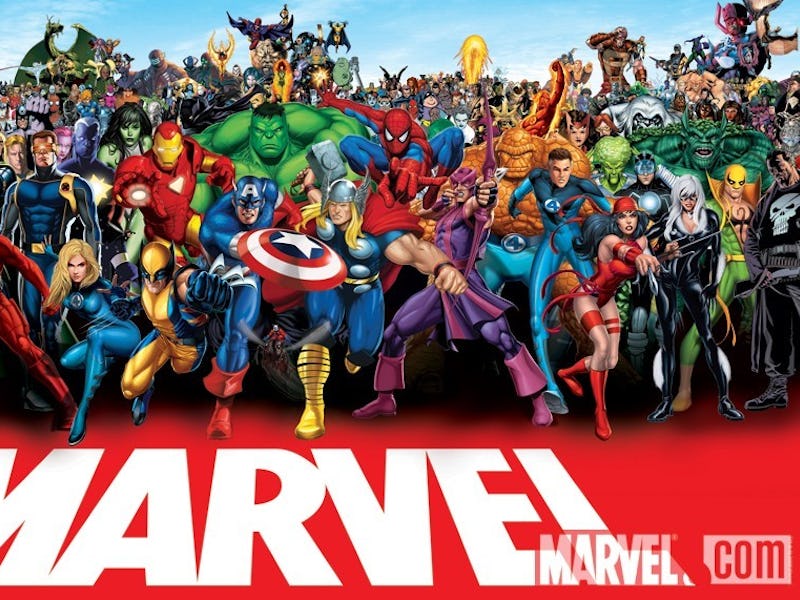Why Are Comics So Damn Complicated?
One comic shop in Dublin defended newcomers to the comic book industry in a Twitter rant heard ’round the world.

Tension is building between comic book publishers like Marvel, which regularly updates its series with reboots and variant releases, and independent publishers like Image, which simply releases stories in chronological order. If a fan walks in and likes the cover art on Saga, for example, it’s easy to trace the comic’s one storyline into back issues and find any of the missing issues the store might need to order in. On the other hand, fans looking to read Marvel comics that featured Jessica Jones, after watching the Netflix series, were faced with tracking down Jessica’s appearances in Alias comics, though those storylines sometimes conflicted with plot lines involving Jessica in other heroes’ comics. DC isn’t any better; when folks discuss a future Batgirl movie, it’s never clear which Batgirl they’re talking about, as the character has appeared in hundreds of variant series with different names, personalities, backgrounds, and allies. What is the point to such a complicated world?
On January 18, Dublin comic shop Big Bang Comics tweeted out criticisms of the comic book publishing industry. The store blamed confusing publication rules for keeping readership down, but it also implied that DC and Marvel were floundering in competition with Image, the publication company that “just [keeps] growing and growing and taking the majors’ talent away.”
The Twitter rant was incredibly savvy, and the comic shop gained followers as fans RT’d the store’s qualms to an international audience, but many of the storeowners’ questions remain unanswered.
In 2014, Wired tried to explain one of the many series-wide changes made in DC Comics, and writer Laura Hudson found herself tracing the publisher’s affection for complexity back to the 1950s.
“Back in 1985 — exactly 30 years before Convergence — DC Comics had another huge continuity shakeup known as Crisis on Infinite Earths, which deleted the Multiverse and vastly simplified many of the conflicting ideas that had accrued during the preceding decades of their books. There are actually some pretty smart reasons for trying something like this. Writing dozens of comics a month for years (or decades) in an interlocking, lore-heavy universe has a way of creating a lot of baggage that can get pretty heavy and complicated after a while, and something like Crisis on Infinite Earths can be a good way to reboot and rally, both creatively and for readers.”
Now that DC has yet another series-wide reboot planned for its characters, this time to reflect its burgeoning cinematic universe, the question remains the same: why do this to your readers? For those of us who follow only a few characters without identifying as DC fanatics, another reboot after the New 52 dropped just last year feels like sadism.
Some have suggested that the best way to get a handle on any particular character in the DC or Marvel Universe is to turn to either that character’s Wikipedia article, or the DC or Marvel databases on Wikia. Both publishers re-release encyclopedias of their complete universes often, which seems to suggest that their penchant for complexity is just another way to sell products. Big Bang Comics complained about variant covers and re-released old issues, as well, but the thought process behind those is clear: sell readers more of what they like, tell them each issue is collectible, and they’ll buy more than one. A particularly shameless example of this is Marvel’s “hip-hop variant” cover trend, which features superheroes recreating famous hip-hop album covers.
Another thing DC and Marvel gain from creating confusing, cross-referencing, and contradictory universes, aside from money, is the ability to experiment with every character. It’s no secret that gender-bending has become a popular trope in contemporary superhero comics, and the already-established multiverse setup allowed publishers to rewrite many of their superheroes as people of color, or as women, in 2015.
Although no one can find an explanation other than increased revenue for Marvel and DC’s convoluted sales tactics, shops like Big Bang Comics have begun to take notice of the surge in requests for comics from Image. Image, which famously values storytellers and artists over serialized characters or tie-in crossovers, is doing just fine without the buyer-manipulation that Marvel and DC employ. If we’re lucky, the values of independent and smaller comic book presses will begin to spread.